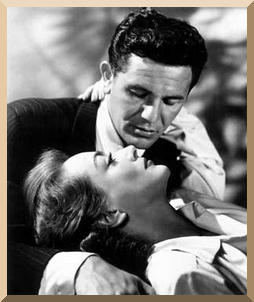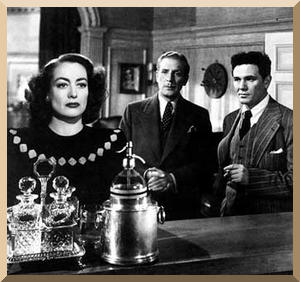


Initially resisting Garfield, not wanting to risk a messy attachment, she eventually yields to his advances and falls in love with him. Garfield's poor-but-proud mother (Nelson), who is a strong force in his life as established in the first half hour of the film, wishes he would get rid of her as they are from two distinctly different universes and she feels that nothing good can come of it. Crawford and Garfield can't stay away from each other but they are always quarreling and when she spots him with an old lover, she resorts to her barfly existence with her high class party friends. Crawford understands that her affair with Garfield, while deep and emotional, is doomed to end disastrously as all of her relationships in the past. Crawford decides to confront Garfield's mother, to tell her that she truly cares for her son. Nelson cruelly tells her to keep away from Garfield.


While in the midst of shooting Humoresque, Crawford was awarded the Oscar for Mildred Pierce. Suddenly she was one of the hottest properties in Hollywood. As such, Warners decided to enhance her smallish role in Humoresque to make it a full-fledged co-starring part with Garfield. With her favorite cameraman behind the lenses (Haller), Crawford never looked more ravishing. Soft focus vanity shots abound with Crawford's part getting the full star treatment. Adapted from Fannie Hurst's tearjerker, the Odets-Gold screenplay crackles with wit and irony which plays well against the rather somber story.
Garfield plays Paul Boray, is a tough, temperamental, and struggling violinist who is hired to play a party at the home of Helen Wright (Crawford), a wealthy dilettante who is fond of cocktails. The jaded Crawford is trapped in a loveless marriage to Cavanagh, who allows her to engage in various sexual forays. She helps his career, then, functioning as his patroness, she presents him to the public and he is hailed as a bright star on the classical horizon.


While listening to Garfield perform on the radio, she makes the decision to end it all by walking into the ocean. Garfield's playing was so believable in the movie due to a brilliant bit of inventiveness on someone's part; a real violinist's arm was passed through a hole in Garfield's coat so the fingering would be authentic. At the same time, a second violinist hid behind Garfield and took care of the bow work. Then Isaac Stern dubbed all of the violin playing. It was movie magic. The results were convincing and helped the picture enormously.
Levant more than holds his own as the comedic relief to the heavy love story and his presence is not only welcome, it's necessary to maintain a balance in the screenplay. Check out a very young Robert Blake playing Garfield as a child. More than 20 classical pieces also helps to propel the story forward and contributes to the general richness of the film. This is my personal favorite Joan Crawford film. A well-mounted project in which Crawford basks in its high production values and turns in the best performance of her career. Humoresque, in my opinion is even superior to to her most famous role in Mildred Pierce..

- Joan Crawford - Helen Wright
- John Garfield - Paul Boray
- Oscar Levant - Sid Jeffers
- J. Carrol Naish - Rudy Boray
- Joan Chandler - Gina



- Jean Negulesco - Director
- Jerry Wald - Producer
- Zachary Gold - Screenwriter
- Clifford Odets - Screenwriter
- Ernest Haller - Cinematographer
- Franz Waxman - Composer (Music Score)
- Rudi Fehr - Editor
- Hugh Reticker, Jr. - Art Director
- Leo F. Forbstein - Musical Direction
- Clarence I. Steensen - Set Design
- Adrian - Costumes/Costume Designer
- Bernard Newman - Costumes/Costume Designer
- Roy Davidson - Special Effects
- Isaac Stern - Consultant/advisor


- Best Score (nom) - Franz Waxman - Academy










